Herein will follow an update from the Swedish education program. Perhaps to call it an update would be to overestimate its size and current importance. A first glimpse of what is to hopefully become something rather exciting is perhaps a more appropriate label.
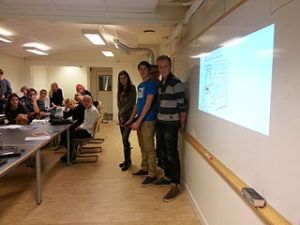
To actually have as a part of the Swedish Wikimedia organisation an education program is a rather new and thrilling idea. The year of 2012 is the year where the Swedish education program has seen the light of day and where the first goals were set as to what should be regarded a good result for a first step in creating and shaping an education program.
I, Sophie Österberg, became engaged in Wikimedia Sverige as an intern undergoing a six-week internship which led to the great opportunity of being offered a job as education manager. With pride and great joy I commenced this position in the beginning of October. Let me though tell you that these two months have felt rather more like a year, be it the intensive work, the conferences, the bright ideas thrown at my table, the inspiration from beautiful minds all over Sweden and foremost, the joint motivation to create something worthwhile, lasting and qualitative, not for Wikipedia or Wikimedia solely, nor for only students or their teachers. But for us all, as a great global society. Well. That might perhaps be a goal to far-fetched to reach, but at least there is a vision in place.
We have looked at the current programs in place around the world to learn from their experiences and to gain knowledge in what we could reuse here in a Swedish context. We have mostly spoken to and looked at the German and the American examples of education programs, but we have been flirting a bit with the Indian and Egyptian as well.
To date we have met teachers at conferences, had individual meetings, lunches, coffees (coffee is huge in Sweden, read more about this here), held workshops, shared ideas to teachers about how to use Wikipedia, met public institutions, held lectures, been part of public debates, created and translated material, thought about how a program should best be organised, read about current trends in education in Sweden, been open to learn about the new Swedish curricula and find out how best to match Wikipedia in education with it.
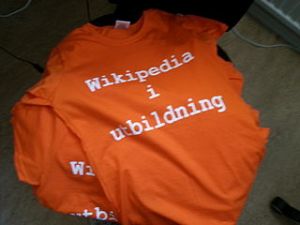
But most importantly, wee have given ourselves a face. We have become people who actually exists. It may sound ridiculous, but let me tell you that the most common comment we have been met by is ‘Wow, do you guys actually exist?”. Yes we do. We have simply been rather silent about it. But this is the end to that silence!
Hello world and at the moment, Hello Sweden! This may sound trivial, but it is not. People have found that there is someone, there are people, with whom they can build trust and communication. We exist, we are real and we are to be trusted. Let us not forget that this is the strongest currency there is between humans, no material or other physical resources may ever be as important as the intangible trust which we build between and in relation to one another.
Let me though share the more practical aspects of what have been done, in a rather sincere and honest tone. I do think that this programme initially did lack some confidence; read more about the Swedish mentality here. We didn’t have an understating of how many teachers and professors would be interested. This has led us in a rather interesting direction, which is now to be turned into something more long-lasting and fruitful.
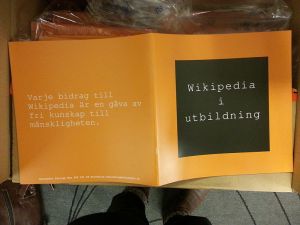
We printed brochures and t-shirts and talked to teachers who are using Wikipedia. We organised volunteers to come with us to teacher conferences and we stood in our bright orange t-shirts and spoke about the education program which had just been initiated. These conferences did make us realise that people were interested, curious, and above all, did have plenty of opinions regarding Wikipedia and the use of it in education.
Whilst standing at these events and meeting teachers and others within education, we started to get invitations. Teachers wanted workshops, professors wanted lectures, institutions of education wanted information, among many others. Was our lack in confidence unrealistic? Yes!
Suddenly, we were buried with workshops, meetings, cravings for information, lectures, more conferences and seminars and we had to rethink. And one key thing we did realise with this was that we could actually, which is not easy to do with lacking confidence, set demands. So with glowing confidence and surprise, it was simply to go back and hide in our basement office and rethink. If we could set demands, find only the ones who are eager to actually do work on Wikipedia and other projects, whilst creating a long-lasting and qualitative cooperation, what would we do?
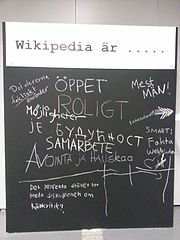
Well, first we obviously had to go to those workshops, meetings, lectures and such that we had planned and offered ourselves to do. And some of them proved to be fruitful. Perhaps due to our generosity in coming and talking about, and holding workshops about, Wikipedia for professors and their students, and teachers with their pupils for free. But some of them turned out to be one-offs. Which is an issue, as we should not aim to hold one-off events as it will most probably not enhance contribution to any Wikimedia project.
At the moment, seven of these early promised ideas are most likely to bloom and prosper, and hence, provide beautiful contribution to Wikipedia and other projects. These are;
– The Royal College of Music. We briefly met with this professor over lunch. He is an acquaintance of a colleague here at Wikimedia Sweden (start with the ones you know!). He was interested in Wikipedia and how he could contribute to it with his students. His greatest motivation was to improve articles about music production as that was his broad area of research and a course which he currently lectured at the university. This course had four students who are about to become teachers in music and music production. He emailed a while after this lunch, after having spoken to his colleague who also enjoyed the idea of having students improving articles in the area of music production. So we set up a workshop, here at the Wikimedia office. We did, during three hours, go through the basics of Wikipedia. They seemed to get it and we set up a Wikipedia project on the Swedish Wikipedia called music production. We had already planned another workshop a while later and the idea was that they were going to contribute and then have next workshop about what they encountered. But, not much happened before that next workshop. I was stressed, what had gone wrong? What had I done? Not done? I spoke to the professor before the next workshop and he told me the students had just had a week off and had after that had intensive study for a practical exam. It did cool me down a bit, but the issue was still there, nothing had been contributed to the Swedish Wikipedia, was I wasting my time and most importantly, the money that had been donated to Wikipedia and thus, in hope of its continuation and advance? We met again, one professor and the four students. They were curious, had intelligent questions about neutrality, critical thinking and the ‘lack of control’ on Wikipedia. We had rewarding dialogues about these subjects and then circled more exactly what was to be done before the next time we would meet up. But the most important thing during this second workshop was that the professor had, after having been shown the basics of Wikipedia and had the time to talk about how it is organised, realised how he would want it to be more integrated in his course this spring. Ah, great! I could not have come up with this myself, as he is the one with the extensive knowledge about the course, whilst also being the one teaching it. So I wondered, if it did take two workshops for this professor with his students to come to a point where he clearly could see how they best could contribute, is it worth that time? How do we measure if it is worth that time? How will we know if these contributions are qualitative, to Wikipedia and Commons? Should we give goodies (free workshops, lectures) first and then speaking of a long-lasting education program? Or should we demand first, and then provide support and information? It is indeed a rather difficult balance.
– Swedish University of Agricultural Sciences (SLU). Olle at SLU had been in touch with Daniel Mietchen about a Wikipedia-day on 18 January 2013. Olle, with colleagues, have a plan to ask researchers and doctoral students to contribute to Wikipedia with their knowledge, whilst the university through a ‘Wikipedia help-desk’ provide support. We are currently setting up user templates (as they wanted them to look the same for all the SLU users) in 15 languages as the researchers to be asked are from various backgrounds. The Wikipedia-day will be a launch (and most hopefully a yearly event) of this project, labelled ‘Knowledge transfer to Wikipedia from researchers at SLU.’ Olle and I had a long lunch, discussing the various aspects of this project and we are emailing back and forth about the user templates, how they can calculate all their users contributions and what we should do with their logo (which they wished to have on the userpages) as it may not be uploaded and used on Swedish Wikipedia. A volunteer in Sweden has helped to develop a tool which may count several users contributions. The user templates have been placed on the 15 different language versions with a plea for help to translate it into the various languages. Surprisingly many of them were translated past the first and second day. What a true joy it is to work with so many engaged and enthusiastic people around the world. This experience, of asking Wikipedians from Arabic, Persian, Spanish, French and Dutch versions among others, for help, and seeing how quickly people did come and offer their support, provided me with a sincere feeling of awe and sheer humbleness. One sometimes forgets this, sitting in an office in cold and dark Sweden, but this was truly a beaming and uplifting experience, thank you all for the support and help! The support for this project will continue and most hopefully, SLU will have funding enough (they have filed an application for external funding) to employ a Wikipedian who will be their ‘help-desk’ for the next year.
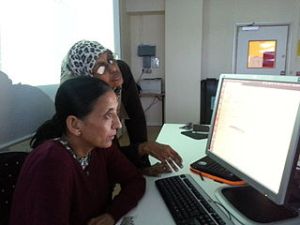
– Swedish as a second language. This is a course in Sweden for newcomers who have been through the initial stages of learning Swedish. I met this teacher at a teachers conference and she liked the idea of using Wikipedia as a way to learn language, since the students could then write about their own passions and interests. So a rather cold (which is quite common in this country) morning I went to have a workshop with them. I was met by old women from Somalia, young girls from Iran, men from Poland, women from Thailand, among many others. For a short moment I was struck by this. These people, with their various backgrounds, upbringing, varied levels of education, and much more, were gathered for this single cause, to share free knowledge to the world. Even though the workshop as such may not have changed Sweden that much (yet) it did make me realise how great this is. The students were eager learners and some were more computer literate than others. One of the old women from Somalia spent most of her time commenting on the lack of information about her dear country, which hopefully will give here inspiration to contribute much more to Swedish Wikipedia about her knowledge of Somalia. Simply because she finds it to be so greatly important that all of us in Sweden know all about her home town, her culture, her language and the known writers and musicians from Somalia. Yes! If we may tap into that more often, the motivation of students to tell about their passions, this will be a lovely journey! This teacher, much like the professor at the Royal College of Music, came up to me after a workshop and had suddenly realised how this could work for her in the future in a much more integrated way as a part of the course. This is to be planned for spring 2013. So, should we then offer these free workshop and hope that this will happen yet again? Difficult question.
– Stagneliusskolan. At another teachers conference we met Dan. Dan works pupils of the age 16 – 18 on a programme called ‘Global profile’. A part of this is that the pupils go to South Africa or Uganda to take part in their education system, culture and ceremonies. They had gained much knowledge, had photos, and videos, but were unsure where to put it. So we gave them the idea of putting part of that information on Wikipedia and asking the pupils to further research about the cities they’ve seen, the ceremonies they’ve attended and so on. Dan liked the idea and we will next week go to Kalmar, a lovely city on the east coast of Sweden, to hold a workshop about Wikipedia and how they may best contribute. Dan wants to record this as he wants his future pupils to be able to do the same thing after they have experienced parts of Uganda and South Africa. Perhaps need I not say that these areas are not the most well-covered in Swedish Wikipedia, so I am very joyous to see where this is leading.
– Gamla Lundenskolan. At the same teachers conference a rather stressed but very sympathetic woman ran by us in the corridor. She did have a few moments to stop and chat with us, and so we did. We told her about Wikipedia, and the education program. She let us know that she was a teacher in handicraft at Gamla Lundenskolan. What could she possibly do on Wikipedia? Well, perhaps her pupils were a bit to young (10-12) to write articles, but could they not take photos of, and make video recordings of making handicraft? The process, the finished work, the tools needed. She liked the idea very much and would contact us again. We heard nothing for a while. Then we got this email from someone saying that she had lost our contact details and had been searching for them for ages before finding us on the internet. She was so interested in the idea and wanted to know how she could get started. We asked her if she would be willing to try out Wikipedia and Commons herself first, to see how it works, as the pupils are so young, it would be essential that she can support and guide them. She was very willing and eagerly told me about the few hours she had off on Wednesday afternoons. That gave me another insight. Swedish (and I am sure it is the same elsewhere) teachers are drowned in administrative tasks, are acting counsellors for upset and confused pupils, have goals to reach, should support pupils go get high grades so the school will do well in rankings, should be inspirational, motivate others, be up to date with their topic, learn new pedagogical methods, use these methods, and also have a life. And here comes I, and we, and ask teachers to do one thing more. Learn Wikipedia and Commons. And she was eager. Not stressed, not in complaint, but eager. I was full of respect, and still am with all the teachers who are eager and interested. This teacher will try out Wikipedia and Commons for herself, with support via phone and email and on Wikipedia of course. We will thereafter schedule a workshop, to see if this a better and quicker way to get the teachers on-board rather than offering free workshops and then having them understand how best they may use it. So let us see what this may bring.
– An online course for teachers. I have gotten the impression that many want to take part in Wikipedia education program around the world. What they seem to, correct me be I wrong, be longing most for is support and help in person. They want to know that there is someone behind that screen. So we thought about how we could make this education program scalable. It is obviously not to have me, or anyone else, sent around this country (which is actually quite big I realised) to hold workshops. It is simply not a good way to use me or anyone else as a well utilised resource. So what then? They want personal support and contact, but we should not spend our lives on trains and buses. A board member mentioned a course, an online course, for teachers. Sure that sounded interesting, but then there’d be no personal contact. Or? The course is currently being designed and the contact will be part of the actual course, and a requirement to pass. Contact will be established to an online supporter, another teacher doing the same course, and us here at the office. So there will all of a sudden be plenty of contact but no sitting on buses and trains. The course is divided into three modules; Why, What and How. Let me shortly tell you about the reason to this. It is actually taken from Simon Sinek, even though he takes the How before the What, but his main point (or what corresponds well in my head) was the Why and the importance of it. That is where we get people on-board the Wikimedia project. By tapping into their intrinsic motivation, their hopes, wishes, joys and desires. What education do they wish to see? What democracy? What society? What do they think about knowledge? So the why seemed essential to have all the participants standing on the same ground, or being on-board the same journey which they were about to depart. The first module is therefore not practical nor technical, it’s philosophical. We mention Kant and Socrates and modern researchers in education like Hattie. This being done with the strong conviction that they will solely contribute long-lastingly and qualitatively if they can motivate themselves and remember the Why. Why they do this. Why it is important. Less important is the What and the How. They can look that up, ask their online supporter, or us at the office. But the why, they need to know for themselves. That is what we need to tap into. So, it’s not a small aim for an online course, but nevertheless, I think it will work perfectly fine. We will award them a certificate from Wikimedia Sweden have they undergone the course, and they may be awarded the grades (same as the articles on Swedish Wikipedia) recommended, good or excellent. The idea is not to reward what is stuck in their head, but rather that they will gain a higher grade if they disseminate what they have learned at this course. Do they hold their own lecture about Wikipedia at their school? Or talk to colleagues about it? Or make an essay or a clip about their experience of using Wikipedia so far? This is what should be reflected in the grades, not how well facts stuck in their own head. The first course will start spring 2013.
– The Educational Radio (UR). Just to make clear, this is not a radio station (as it may sound) but a governmental institution that provide films, material and some radio, in relation to school subjects and thematic topics. They are rather interested in us and especially this one woman, Maria, who eagerly keeps on coming back to us about how we may work together as to enhance the free knowledge in our society. Well, we could not say no to that offer. So we’ve met them a few times. At conferences and twice in their colourful and playful offices. We told them about Wikiversity and how they could put the teaching material there, free for all to use and also, to change to the better. They were skeptical. Someone had written that for them, how would they do with the licensing? We spoke about the importance of having teachers, in this particular case teacher who teach foreigners Swedish, collaboratively enhancing the quality of their teaching material whilst using the videos they provided. So the teachers could use Wikiversity to share information on how they best used these videos, i.e. Set up Wikiversity courses, linking to these videos from UR. They were still skeptical and the meeting had come to an end. But a short while later I received an ecstatic email from Maria having been given time to dedicate to Wikiversity and how they best could use it. So this is about to depart!
More than anything, we are currently building trust. We are aspiring to show teachers, pupils, students, public institutions and others that we are knowledgeable, we are trustworthy and we have brilliant resources that they may freely utilise. But people do not solely wish to utilise a tool, they wish to know who the person is behind this tool or this project, such as Wikipedia. That has at least come to be my strongest impression past these first two wobbling months of an education program.
So current status: Yes, we do exist. And at the moment, the future seems only bright, bold and beautiful.
Please do share ideas, comments or your experiences of education programs that might be useful for us at utbildning@wikimedia.se
We greatly look forward to hearing from you and very much appreciate your input.
Sophie Österberg, Wikimedia Sverige

Can you help us translate this article?
In order for this article to reach as many people as possible we would like your help. Can you translate this article to get the message out?
Start translation